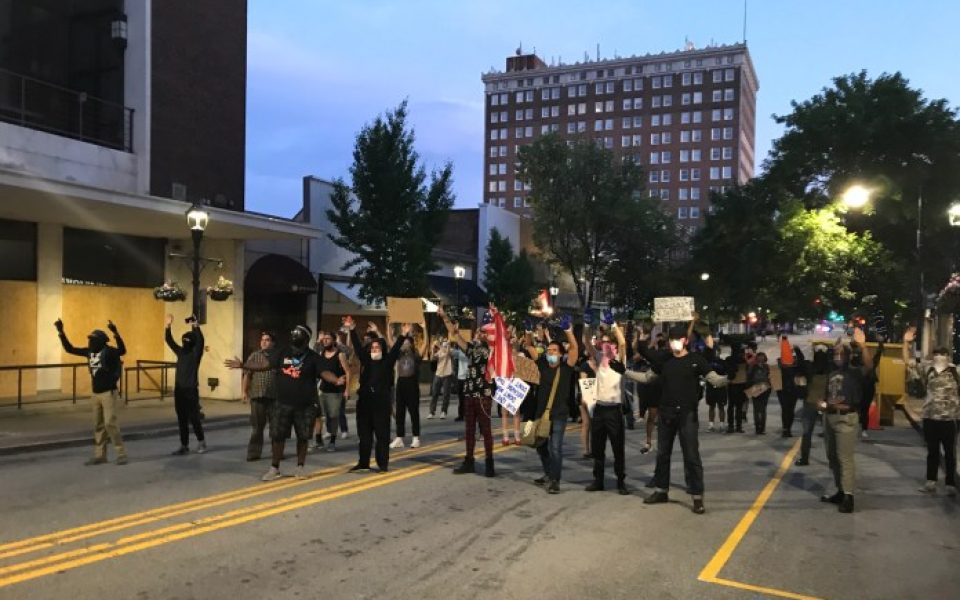The ACLU of North Carolina is asking the city of Greensboro to lift a curfew imposed in response to looting last weekend during protests against the police killing of George Floyd, arguing that it violates the First Amendment and “invites arbitrary and discriminatory enforcement against communities of color.”
The curfew was imposed in Greensboro starting on Monday, from 8 p.m. to 6 a.m. and remains in effect indefinitely. The city of High Point issued an identical curfew on the same day.
The letter from the ACLU of North Carolina addressed to Mayor Nancy Vaughan argues that the city’s action violates both the First Amendment of the US Constitution and Article I, Section 12 of the North Carolina Constitution. The civil liberties organization sent similar letters to the cities of Raleigh, Charlotte and Asheville, where curfews are also in force.
“Its blanket restriction on all movement within the city limits during those hours is not narrowly tailored and also violates the Constitution’s protection for freedom of movement,” Legal Director Kristi Graunke and Senior Staff Attorney Irena Como wrote. “Overly broad curfews imposed by local leaders indefinitely suspend free speech at a time when people are taking to the streets to exercise their constitutional rights to protest racially-discriminatory police violence. Notwithstanding the exemptions, the curfew forbids expressive activity at the core of the First Amendment.”
Vaughan said she felt she had no other choice but to order the curfew.
“It was put in place as a way to preserve life after the escalating violence on Saturday and Sunday night,” she said in an interview earlier this week. “Saturday night was bad enough. Sunday was progressively worse. It wasn’t about property damage. It was someone was going to get killed.
“Just like the coronavirus, this is the most important thing to me was the health of our community,” Vaughan added. “I knew it was a drastic step, and I didn’t take it lightly.”
The ACLU also contends that the curfew in Greensboro violates the due process and equal protection clauses in the US Constitution and NC Constitution.
“This overbroad curfew applies to all sorts of innocuous, basic conduct such as going shopping, and effectively places residents, with extremely limited exceptions, under house arrest for 10 hours a day,” Graunke and Como wrote.
“By making it unlawful to be present on public streets anywhere in the city, with limited exceptions, the curfew gives police too much discretion over whom to arrest and will likely lead to selective law enforcement against communities of color,” the letter continues. “Combined with the aggressive show of military force and the troubling accounts of police using tear gas, batons and rubber bullets against peaceful protesters we are witnessing around the country and in North Carolina, this curfew enables Greensboro police to reenact the violence and brutality that are at the root of the protests.”
On Tuesday, Greensboro police arrested six black men at the culmination of a peaceful protest after curfew. All were charged with Weapons at Parades Etc. Prohibited, a misdemeanor, and variously charged with Carrying Concealed Weapons; Resist, Delay Obstruct Public Officer and other offenses. One was charged with Manufacture/Possess Weapon of Mass Death/Destruction, a Class F felony.
In contrast, a group of heavily armed white men with extremist affiliations including one who posted violent content on social media and announced his intent to be in Greensboro after the curfew to confront “antifa” and Black Lives Matter, have not been charged. Greensboro police said earlier this week they were exploring whether charges were appropriate.
Join the First Amendment Society, a membership that goes directly to funding TCB‘s newsroom.
We believe that reporting can save the world.
The TCB First Amendment Society recognizes the vital role of a free, unfettered press with a bundling of local experiences designed to build community, and unique engagements with our newsroom that will help you understand, and shape, local journalism’s critical role in uplifting the people in our cities.
All revenue goes directly into the newsroom as reporters’ salaries and freelance commissions.


Leave a Reply